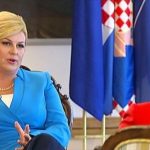Disagreements within Croatian political leadership have allowed Vučić to accomplish his goals.
The manner in which the official visit of Serbian President Aleksandar Vučić to Zagreb took place has contributed more to the weakness than to the stability of Croatia and its official policy of building good-neighbourly relations. Vučić’s visit has weakened Croatia, and the Croatian leadership is the reason why, reports Večernji List on February 14, 2018.
President Kolinda Grabar-Kitarović has invited Vučić for an official visit without proper coordination with the government, which claims that it was surprised by the President’s announcement on 30 January that the Serbian President would arrive in Croatia on 12 February. Such lack of coordination about a very sensitive visit by a foreign statesman sends a message about the weakness of Croatian institutions.
The government even issued a statement by the Ministry of Foreign Affairs in which it expressed its disagreement with the timing of the President’s invitation to Vučić, using the controversial exhibition about Jasenovac, which Serbia had organised at the UN in New York, as an argument for this disagreement.
Although the Ministry did not specify which historical inaccuracies it found in the New York exhibition, we do know that issues such as the controversial plaque with the “For Homeland Ready” inscription in Jasenovac are some of the reasons why separate commemorations are held at the site of the former concentration camp. All this shows that Croatia’s attitude towards Jasenovac is not something which is being invented by alleged provocateurs from abroad, but that this is a real problem which exists at home. This problem weakens Croatia, and this weakness is then exploited by Serbian officials who have never sincerely accepted the existence of independent Croatia.
Ultimately, it is legitimate to politically use the “propaganda exhibition” in New York to draw a line which Croatia will not cross. It is also not a problem to do the opposite: to not discuss the exhibition and focus on building better relations and then invite Vučić to come to Zagreb right now. But, there is a problem when the government does one thing, and the President does the other. The government drew a red line which Croatia would not cross, only to see the Croatian President cheerfully cross that very same red line.
The same goes for the war compensation issue. On the day when Prime Minister Andrej Plenković mentioned this in his speech at the European Parliament, it was clear that the Office of the President was surprised. Topics such as war damages, which are probably among the most complex discussion topics for any country, cannot be placed on the agenda by being mentioned casually in Strasbourg. The only serious way of introducing such a question is coordination, quiet diplomacy and proper preparation, as well as the consent of all sides to open such a matter.
For this reason, Plenković’s decision to start discussing the issue seemed more like an attempt to undermine the visit he had apparently disagreed with. Which again brings us back to the problem of the President surprising the government and vice versa. With the President and Prime Minister so busy trying to take each other down a notch, Vučić could easily play his role as a peacemaker turned towards the future. He did not even have to try to score a goal against Croatia, since Croatia has scored enough own goals by itself.
Translated from Večernji List (written by Tomislav Krasnec).








